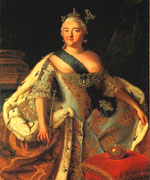History of a portrait
 The art of portrait painting dates by already several centuries. Egyptian sculptors created rather precise depictions of a person. A statue had to bear a portrait resemblance so that after death of a person his soul could easily find its owner.Pictorial fayum portraits that were executed in encaustic technique (wax painting) served the same aims.
The art of portrait painting dates by already several centuries. Egyptian sculptors created rather precise depictions of a person. A statue had to bear a portrait resemblance so that after death of a person his soul could easily find its owner.Pictorial fayum portraits that were executed in encaustic technique (wax painting) served the same aims.
Ancient Greece gave us idealized portraits of statesmen, poets and philosophers. Ancient Rome brought to the forefront veracity and preciseness of a characteristic.

Golden age of portrait genre fell on the period of Renaissance when the main value considered being a human as an energetic creative person.
The priorities'd been changed in the XVIII century. A chamber portrait was put in the forefront. In the XIX century a human's personality was presented in all her psychological complicity.
The XX century was characterized by the most contradictory tendencies - from vivid and realistic individual characteristic to expressive deformation of a model. Nowadays portrait painting is one of the topping genres owning to the art of "new realism" - "video-art", cinema, and photo.
Portrait and Russian art
 For Russian art at the beginning of the XVIII century portrait genre was relatively new one though it had a predecessor parsun. It's a special kind of a portrait in the XVII century characterized by a definite conventionality of representation of a human face and figure.
For Russian art at the beginning of the XVIII century portrait genre was relatively new one though it had a predecessor parsun. It's a special kind of a portrait in the XVII century characterized by a definite conventionality of representation of a human face and figure.
Direct intercourse with advanced representatives of art which was so desirable by Peter I had a great influence on accelerated development of this genre. At that time a portrait was a necessary and especially valuable element of the interior.
Portrait painting was characterized by variety. A ceremonial portrait brought from Europe to Russia together with the invited foreign painters was characteristic exactly to XVIII century.

Its task was to show lordliness and might of a social position of a depicted person. In Russia it's first of all portraits of the emperor or the empress in gorgeous royal clothes or of close to the court grandees.
In such portraits background and articles of surrounding furnishing (accessories) played a great role. They had to show high social position and merits of a depicted person.
Along with a full-length ceremonial portrait following variants existed: a knee-length portrait with all regalia, a half-length portrait in the ceremonial clothes which could be afforded by inferiors.
A chamber portraitbecame especially widespread in the XVIII century. It gave a greater possibility to a painter for a true and deeper characteristic of a person.
 They stressed the value of a person as a statesman and admitted his right to express his natural feelings. In this kind of portrait painting such artists as Antropov, Argunov, Shibanov, Rokotov, Levitskiy, Borovikovskiy displayed their talent.
They stressed the value of a person as a statesman and admitted his right to express his natural feelings. In this kind of portrait painting such artists as Antropov, Argunov, Shibanov, Rokotov, Levitskiy, Borovikovskiy displayed their talent.
In the XVIII century portrait miniature was also popular among people. Due to its small size it was convenient in private life and in journey as memory about close people. Portrait miniature is well-known in Russia from Peter I epoch. As a rule, the names of miniature painters were not retained. As is generally known people took a great interest in the miniatures by Borovikovskiy.
The second part of the XVIII century is the period of reformations hold by Peter I. It gave a strong impulse to development of culture, art and painting. Renovations took place in all spheres. Fine arts stood all changes easily. Traditional system of icon-painting was left behind. A portrait painting replaced it.
 . It should be noted an important moment in the tradition of a Soviet portrait in the 30-s and 40-s. It was characterized by philosophical interpretation of a personality from the position of so-to-speak socialistic humanism.
. It should be noted an important moment in the tradition of a Soviet portrait in the 30-s and 40-s. It was characterized by philosophical interpretation of a personality from the position of so-to-speak socialistic humanism.
This positions determined the essence of portrait works of Soviet people which was formed by Soviet ideology and namely by Soviet society. Among artists of Soviet portrait school there are painters whose works are well-known and deserve the highest appreciation of their authors' talent.
In the 50-s portrait painting became a bit stereotyped. The seventies, especially their second half, caused an interest to a private life of a person and showed up a bent to decorative search in portrait painting. All this characteristics of portrait genre are worth of consideration as they've got further development in the 90-s of XX century.





